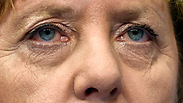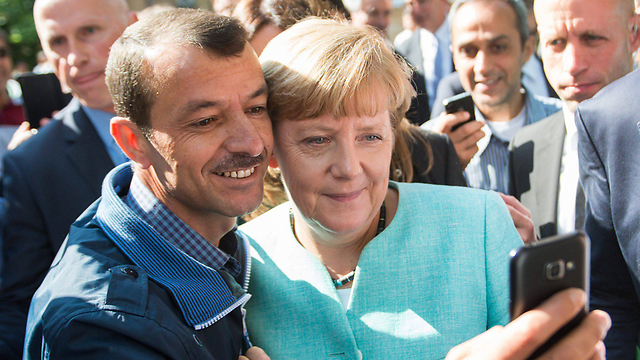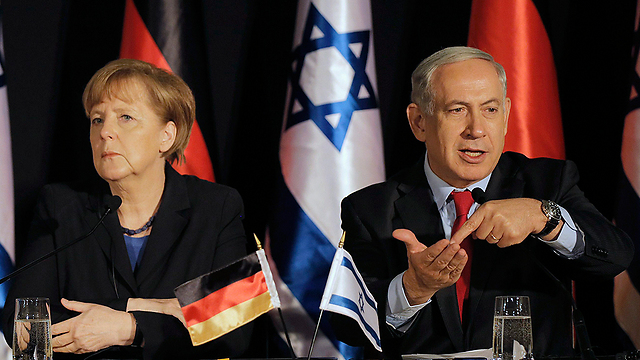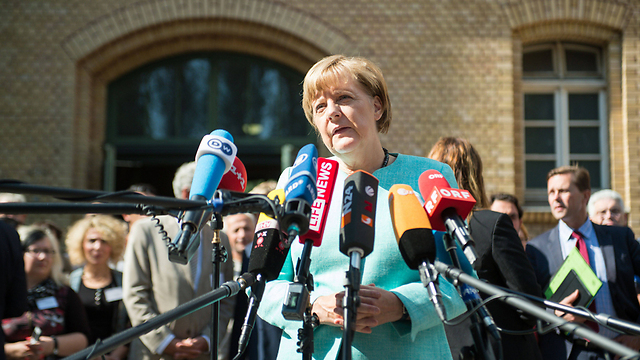
'We are not neutral': Angela Merkel on Israeli-German relations
The world's most powerful woman sits down for an interview ahead of annual meeting with Netanyahu and the 50th anniversary of Israeli-German relations.
The most powerful woman in the world, who just last week was portrayed on the cover of famous magazine Der Spiegel as heir to Mother Teresa, now finds herself isolated in the European Union, attacked by members of her own party (the Christian Democratic Union of Germany), and with a long-unseen decline in her popularity among the public.
This crisis comes at a symbolic time. Ten years ago, on September 18, 2005, Merkel won the elections and made German history: She became the first woman, and the first former East German politician, to head the government in Berlin. In the past decade, Merkel has cemented her public standing so strongly that it’s hard to think of anyone who could replace her as chancellor.
Her effect on Germany is so great that youngsters today are considered part of the “Merkel generation”. Her governing style – making decisions after long deliberations, usually ending at the last moment – has brought about a new German verb: “Merkeln”.
In the past summer, rumors arose about the chancellor’s intentions to run for a fourth straight term in the 2017 Bundestag elections. Merkel’s opponents from the Social-Democratic Party announced in advance that they have no chance of defeating her. But that could change.
The ultra-conservative wing of Merkel’s party is fuming at her generous refugee and immigration policies, as well as her declarations about Islam having a place in Germany. There were talks of political dealings meant to remove the chancellor, or at least teach her a lesson, but right now the conservatives know they don’t have a true alternative to Merkel.
Merkel has a bigger cause for concern right now: The growing popular protests against her refugee policies. A few weeks ago, when she visited an absorption center in Heidenau, Saxony, a town known for its large concentration of extreme right-wing and neo-Nazi activity, refugees happily surrounded her, hoping for an opportunity to take a photo. But the reception outside the center was a bit colder: Local residents called Merkel a traitor, and shouted for her to “get out!” Her advisers said the atmosphere was reminiscent of lynchings.
Just a year ago, Germany was rocked by a popular protest movement called PEGIDA, which came out of Saxony and swept across the nation. In weekly rallies, which attracted huge crowds of both supporters and detractors, slogans were shouted decrying Muslims and Immigrants. But more than that – PEGIDA rallies also lambasted the political establishment in Germany, with Merkel as its largest target.
“If we need to start apologizing for presenting a friendly face to the world, then this isn’t my country,” Merkel said in response. She also gave a hint of a threat there: Going home of her own accord if her conscientious, humane policies were not supported.
For the time being, Merkel continues to manage the many inner and outer crises: Refugees, Greece, the Euro, Russia, ISIS. She left the European Union leaders’ summit in Brussels this week and flew over to the world leaders’ summit in New York, which was held in conjunction with the annual UN General Assembly meeting and dealt with long-term global development. Next week, she’s set to host Prime Minister Netanyahu, as well as several Israeli ministers and deputy ministers, for their yearly consultation meeting.
These meetings were initiated by the chancellor in 2008, as a way of improving relations between the two countries and ensuring their future development. This year’s meeting is expected to have a powerful symbolic aura, since it marks the 50th anniversary of the establishment of diplomatic relations between Israel and Germany.
Research into the status of relations ahead of the half-century mark reveals a troubled reality. Israelis are mostly accepting of Germany, even with the looming shadow of the Holocaust. Germans, though, aren’t really at peace with Israel. Many of them tend to make comparisons between it and Germany under the Nazis.
Chancellor Merkel, a true friend of Israel, feels that it’s important to talk about the two countries’ relationship. And so, despite her busy schedule, and despite the fact that she’s giving very few interviews to foreign press sources at this time, she agreed to give one to Yedioth Ahronoth ahead of the yearly government meeting and the 50th anniversary.
A meeting at the washing machine
We meet in Merkel’s office, which is located on the seventh floor of the Chancellor’s Office building in Berlin. The building is concrete and square-shaped, with a large glass circle at the front, a look that has earned it the nickname of “government washing machine”.
You don’t see the tension of recent events on Merkel’s face, or the effect of long work hours, full of meetings and discussions. She has a welcoming, smiling presence that lacks the usual arrogance of politicians and statesmen, especially those in positions as high as hers. Her humane attitude and unassuming manner are a main reason for her popularity with the public up to now.
On May 12, 1965, the day diplomatic relations were established between West Germany and Israel, you yourself were 11 years old, living in East Germany. Did you feel something of the historical value of that day? How would you judge that historical development today?
“At the age of about 11, and as a former resident of East Germany, I did not yet take note of the establishment of diplomatic relations. At a later age, it became clear to me that East Germany, unlike West Germany, didn’t have relations with Israel. When I was working as a physicist I suffered from it, because I couldn’t order publications by Israeli scientists directly.
“We in the East didn’t have access to copy machines, so I asked an American scientist to send me copies of Israeli colleagues’ work. I was glad that after the wall fell the East German parliament, which was freely elected, chose to establish relations with Israel in 1990.”
On May 12, 2015, 50 years after the establishment of diplomatic relations between Germany and Israel, German pundits wrote of “a friendship in danger”, “German-Israeli a-symmetry”, and “the disappearance of German understanding of Israel”. Even German President Joachim Gauck expressed concern for the fact that nearly half of the German population holds a negative opinion of Israel. Do you share this concern? Do you feel danger as well? What can be done about it?
“Good relations require constant care; you have to speak with one another all the time, especially if there’s a difference of opinion. At the start of my term, I initiated the inter-governmental talks between Germany and Israel, which will take place next week for the sixth time. It’s an opportunity to talk in a very concrete way about wide aspects of our relations: For instance, the cooperation on scientific issues, the joint cultural work, the youth exchanges, and the development initiatives we’re implementing together in several countries.
“We are doing this out of an awareness for Germany’s constant responsibility for the fracturing of civilization in the time of the Holocaust and an awareness for the shared values and interests. Israel is a world leader in many areas, as an example I’ll mention the start-up culture, or the research area I’ve already mentioned – where a very tight cooperation exists with the German scientific world.”
“German-Israeli relations keep developing. Every time, we learn all over again that Israel is the only democracy in the Middle East. That’s the crucial point – even if we’re split on a few issues that have to do with the settlement policies, and even if we would have liked there to be a negotiation toward a two-state solution.”
Where exactly do you see the things Germany and Israel have in common?
“First and foremost, the values that Germany and Israel represent in the world unite us: Freedom, democracy, and human dignity – which apply to every man and woman. I see things in common with a lot of ventures, as well as the cooperation we have in the field of defense policy. However, the most important thing that unites us is of course the basic understanding of the individual’s dignity and his right to self-actualization. That’s what determines things to me.”
A number of polls show that between 40 percent and over 60 percent of Germans compare Israel’s actions regarding the Palestinians to the Nazis’ treatment of the Jews. How did we reach this situation, and what do you think of that comparison?
“The Holocaust as a systematic attempt to wipe out the Jews is a unique crime. This kind of comparison is totally wrong and incomprehensible.”
Where do you think the line that separates legitimate criticism of some of Israel’s actions and anti-Semitism?
“The lines are crossed where a criticism is used to delegitimize an entire people or group. I oppose – even in other contexts and in principle – generalizations that attribute certain character traits, usually bad ones, to entire peoples. Every person is unique. Every place has good and bad people, smart and dumb, nice and not nice, but each individual has a position and the right to respect, which is not to be touched.”
In Europe, but in America as well, there’s a movement that’s calling more and more loudly for a boycott on Israel. The American government passed an anti-boycott law last summer. Should there be anti-boycott laws in Germany and the European Union as well?
“In questions of trade, the European Union usually determines the direction of actions. If we want to change something, we have to get a majority for that. So, for example, there are questions of consumer protection at the European Union level that require labeling of products from certain places. That has nothing to do with a boycott. In principle, I’m not impressed at all by calls for boycotts.”
The German-Israeli committee for school textbook research recently published a study that says Israel’s image in German textbooks is very negative. The committee wrote that “The amazing thing is that since the first German-Israeli committee’s findings were published in 1985 – nothing has changed.” How can we change this situation?
"First of all, it's good thing we have the Israeli-German textbook review committee, which pays attention to such things. If the study's findings are correct, we can change something through co-writing text for schoolbooks, so they also give the Israeli perspective. We have very good experience with German-French history textbooks – it took a long time until we managed to arrive at an understanding about a shared perspective on historical events. It was a very instructive process; maybe we should think about outlining a similar process between our two countries."
In your speech before the Knesset in 2008, you declared that "historical responsibility is part of my country's raison d'être. For me as German Chancellor, therefore, Israel's security will never be open to negotiation." What does this mean on a practical level, and what will happen the day you stop serving as chancellor?
"Israel's security was and Is a very important matter for every German chancellor – and so it will be in the future, too. My statement must be understood in a very comprehensive way. It is frequently reduced to the military aspect, but it refers to an entirely fundamental commitment to Israel's security. We are certainly not neutral. I am working on instilling this recognition in the next generation of young people. I am similarly working to make the future generation's young people to be aware of it."
Does your statement have a military component?
It applies to Israel's security in general. It cannot be reduced to only one area – but it's impossible to skip any area.
A number of Israeli politicians compared the Vienna agreement with Iran to the Munich agreement of 1938. Are you insulted by this or do you understand such criticism? How can you reassure Israelis about Iran's growing power in the region, while it still officially discusses Israel's destruction?
"Iran's stance towards Israel is unacceptable. We will say this again and again, loudly and clearly. The decisive question for us was whether signing the agreement would help regional security more than a situation without an agreement. At this point there are different assessments. Iran's nuclear capabilities have considerably grown since 2005. We reached the conclusion that the development could be stopped for now – for a relatively long amount of time. For this reason, the agreement looked like a better option than rejecting it – and instead allowing Iran to continue developing a nuclear capability.
"I am mindful of Israel's sensitivity about this topic and its lack of faith in Iran. After all, it is Israel that is directly threatened – but really all of us, the free world, are threatened by Iran arming itself with nuclear weapons. And anyway, regarding the agreement that was signed, I have a different assessment from that of the Israeli prime minister. I am interested in continuing to talk to one another but the advantages and disadvantages of the agreement. Even if I, like other partners, reached the conclusion that the pros outweigh the cone – I still cannot ignore the criticism leveled at the agreement. We do not have absolute certainty that Iran will truly take the path of transparency. In the event that Iran does not adhere to its commitment, the agreement allows for us to reinstate the sanctions."
Do you see any possibility whatsoever for Germany to become a bridge between Iran and Israel?
"Iran must change its unacceptable stance towards Israel. I hope one day politicians who rule in Tehran will reach this conclusion. Until then, I see it as the German government's duty to repeat this demand again and again. Beyond that I'm not interested in overstating Germany's goal and abilities. And what's more important is that we are not neutral, as I said.
Hundreds of thousands of refugees are streaming from the Middle East into Europe, and particularly into Germany. You are interested in combating the root of the problem. Will you also do this through military intervention?
"In everything involving Syria, the first thing that must be found is a political framework to reach a solution. We have repeatedly learned in the past that military intervention without an accompanying political concept does not lead to success. For such a political framework, we need all the regional powers in addition to the United States and Russia. Germany will do its share according to its abilities. In the fight against ISIS< we have supplied weapons to the Kurdish Peshmerga – for the first time to an area where there is an active conflict. In addition, we are training soldiers in Iraq against ISIS.
The meaning of this is that we are already taking part militarily as part of the large coalition against ISIS terrorists.
What will you say to people, including those in Israel, who are concerned that the massive wave of refugees will cause the Islamization of Germany and Europe?
"In Germany, we see the refugees first and foremost as people who fled the horror of the Syrian Civil War. It is our duty to give them protection, as the German basic law and UN treaties on refugees require. Furthermore, Germany has freedom of religion. We will do everything we can to integrate those who will be allowed to stay into our country, our basic law, and our civil laws – with their values of freedom. The refugees must learn our language as quickly as possible, as everything will depend on this later. We will work against any form of religious fundamentalism with determination."
In Israel, you are considered the most popular foreign politician. No other German or European politician has gained so much trust in Israel. How do you explain this, and what does mean for you personally?
"I am just happy that there are good, friendly relations between Germany and Israel. I act according to my oath as part of my role on behalf of the German people – and I will add that I also work for a strong Europe. Regarding everything involving Israel, there is a broad consensus between us and the Israeli government and people, but there are points of disagreements. And despite that, we have always managed to express these disagreements without damaging the basis of our relations."
A year ago Israeli protesters made a public request for you to open your country's gates to hundreds of thousands of immigrants from Israel, because the cost of living is so high in Israel, unlike in Germany. Did you hear about this and what do you think about this initiative?
"I am grateful that today in Germany there is such varied and rich Jewish life again. I am completely aware that this is not a given considering out history. I am also glad that many Israelis visit Germany – and especially here in Berlin, you can meet so many young people from Israel who are drawn to Germany's capital. And conversely, I am also interested in German people discovering Israel."













